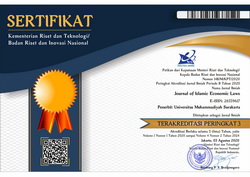ISLAMIC FINANCIAL LITERACY: EVIDENCE FROM INDONESIAN URBAN MIDDLE-CLASS WOMEN
DOI:
https://doi.org/10.23917/jisel.v5i2.18467Keywords:
Islamic financial literacy, urban, womanAbstract
Issues related to Islamic financial literacy are always interesting to study, especially because financial literacy has a close relationship with financial inclusion, including the intelligence of women who are often questioned in terms of financial literacy. The paradigm that women are backward seems to be ingrained in some Indonesian society. Therefore, this study aims to prove that women have the same opportunities, especially in terms of Islamic financial literacy. This study uses an explanatory sequential mixed method, in which qualitative data is taken from the study literature, then analyzed using the Nvivo 12 application. Quantitative data is taken from a questionnaire, then analyzed using the SPSS application. The result from qualitative data analysis would explain more the findings. This study proves that gender does not affect financial literacy, it can be said that women in Indonesia urban middle-class are not left behind. Everyone has the same rights in learning about Islamic financial literacy.
Downloads
Downloads
Submitted
Published
How to Cite
Issue
Section
License
Copyright (c) 2022 Journal of Islamic Economic Laws

This work is licensed under a Creative Commons Attribution-ShareAlike 4.0 International License.



















